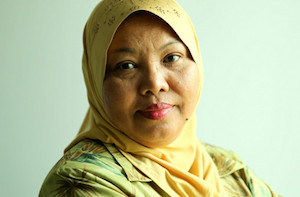Can DAP make it on its own?
PAS president Datuk Seri Abdul Hadi Awang seldom attends Pakatan Rakyat council meetings. Penang Chief Minister Lim Guan Eng says Hadi must make it a point to attend PR council meetings and not allow others to attend to stop Hadi from later revoking decisions that had been jointly agreed upon.
Zubaidah Abu Bakar, The Rakyat Post
PAKATAN Rakyat is still licking its wounds from the damage that arose out of the recent Selangor Menteri Besar crisis.
Selangor already has a new Menteri Besar after the issue of who should replace former Menteri Besar Tan Sri Khalid Ibrahim was “resolved” when Parti Keadilan Rakyat (PKR) deputy president Mohamed Azmin Ali was sworn in last month.
Yet, political discontent among the component parties in Pakatan Rakyat remains.
Indications are that all is not well in the electoral pact, especially between DAP and PAS.
It is a reflection on the fact that despite being in existence for six years, Pakatan Rakyat has not been able to build stronger bonds among its components.
We watched how DAP secretary-general Lim Guan Eng took swipes at Islamist party PAS over the weekend for failing to adhere to set decisions during the crisis.
He did not do it once but twice at separate functions on two consecutive days.
On both occasions, he insisted that Pakatan Rakyat found it difficult to continue operating when PAS has a leader who could override decisions made in his absence during the coalition’s presidential council meetings and by his own party.
“We want to see a commitment that any agreement achieved will be carried out.
“Don’t make a decision today and the next day it is overruled by the president,” Lim was quoted saying at the Kuala Lumpur DAP convention on Saturday, adding that his party was not afraid to go solo if need be.
“If the president can reject the central committee, we do not know how to deal with this party,” he had said in an apparent reference to PAS president Datuk Seri Abdul Hadi Awang.
Then, at a Petaling Jaya DAP fund-raising dinner the next day, Lim, in saying that every party must keep its promises and fulfil its commitments to gain the trust of the people, had asked Hadi to keep his promises and fulfil his commitments to the electoral pact.
Lim went on to suggest that Hadi make it a point to attend the Pakatan Rakyat council meetings and not allow others to attend to stop Hadi from later revoking decisions that had been jointly agreed upon.
Hadi seldom attends Pakatan Rakyat council meetings; he was also not present at the presidential council meeting that endorsed Datuk Seri Dr Wan Azizah as the sole candidate for the Menteri Besar post.
The PAS president also went against the PAS central committee decision and submitted other names for the post for the Sultan of Selangor to consider.
The Selangor Menteri Besar crisis, that dragged on for months, had opened up differences between PAS and its allies.
DAP leaders and its rank and file had been attacking Hadi, who at the height of the crisis, went against the decision of his party’s central committee to endorse Dr Wan Azizah for the Selangor Menteri Besar post.
The strained relations worsened after two Pas state lawmakers who backed Dr Wan Azizah were treated as “heroes” by DAP.
PAS, Hadi in particular, was unhappy. This led to Hulu Kelang assemblyman Saari Sungip and his counterpart from Morib, Hasnul Baharudin, being attacked by the party president and delegates at the party’s recent muktamar and their eventual one-year suspension from the party.
There were fewer attacks on Hadi among PKR leaders and members, probably because they are too engrossed in the on-going appeal case involving the party’s de facto leader, Datuk Seri Anwar Ibrahim.
But why had PAS leaders, including Hadi, chosen not to respond to these provoking statements?
The other question is whether DAP, in finding it becoming more difficult to work with PAS under Hadi’s conservative leadership, is contemplating going solo?
Or, perhaps, the secular party wants to initiate a move to “expel” PAS from the pact?
Previously, it has always been PAS that many believed to be considering to opt out of Pakatan Rakyat because of its continuous flirting with Umno and, more recently, its tendency to take a more conservative stand on issues relating to Islam.


